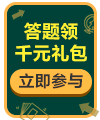全国教师资格统考《英语学科知识与能力(高中)》模拟试卷一
20. Which of the following nominating patterns can a teacher adopt to ensure that all students are activity involved in classroom activities?
A. Nominating those who are good at English.
B. Asking questions in a predicable sequence.
C. Nominating students after the question is given.
D. Nominating students before giving the question.
请阅读Passage 1,完成21~25小题。
Passage 1
From the very beginning of school we make books and reading a constant source of possible failure and public humiliation. When children are little we make them read aloud, before the teacher and other children, so that we can be sure they “know” all the words they are reading. This means that when they don’t know a word, they are going to make a mistake, right in front of everyone. After having taught fifth-grade classes for four years, I decided to try at all costs to rid them of their fear and dislike of books, and to get them to read oftener and more adventurously.
One day soon after school had started, I said to them, “Now I’m going to say something about reading that you have probably never heard a teacher say before. I would like you to read a lot of books this year, but I want you to read them only for pleasure. I am not going to ask you questions to find out whether you understand the books or not. If you understand enough of a book to enjoy it and want to go on reading it, that’s enough for me. Also I’m not going to ask you what words mean.”
The children sat stunned and silent. Was this a teacher talking? One girl, who had just come to us from a school where she had had a very hard time, looked at me steadily for a long time after I had finished. Then, still looking at me, she said slowly and seriously, “Mr. Holt, do you really mean that?” I said just as seriously, “I mean every word of it.”
During the spring she really astonished me. One day, she was reading at her desk. From a glimpse of the illustrations I thought I knew what the book was. I said to myself, “It can’t be,” and went to take a closer look. Sure enough, she was reading Moby Dick, in edition with woodcuts. I said, “Don’t you find parts of it rather heavy going?” She answered, “Oh, sure, but I just skip over those parts and go on to the next good part.”
This is exactly what reading should be and in school so seldom is—an exciting, joyous adventure. Find something, dive into it, take the good parts, skip the bad parts, get what you can out of it, go on to something else. How different is our mean-spirited, picky insistence that every child get every last little scrap of “understanding” that can be dug out of a book.
21. According to the passage, children’s fear and dislike of books may result from _____.
A. reading little and thinking little
B. reading often and adventurously
C. being made to read too much
D. being made to read aloud before others
22. The teacher told his students to read _____.
A. for enjoyment B. for knowledge
C. for a larger vocabulary D. for higher scores in exams
23. Upon hearing the teacher’s talk, the children probably felt that _____.
A. it sounded stupid
B. it was not surprising at all
C. it sounded too good to be true
D. it was no different from other teachers’ talk
24. Which of the following statements about the girl is TRUE according to the passage?
A. She skipped over those easy parts while reading.
B. She had a hard time finishing the required reading tasks.
C. She learned to appreciate some parts of the difficult books.
D. She turned out to be a top student after coming to this school.
25. From the teacher’s point of view, _____.
A. children cannot tell good parts from bad parts while reading
B. children should be left to decide what to read and how to read
C. reading is never a pleasant and inspiring experience in school
D. reading involves understanding every little piece of information
请阅读Passage 2,完成26~30小题。
Passage 2
A new Chinese-led international development bank announced its first four loans on Saturday, pledging to lend $509 million for projects to spread electric power in rural Bangladesh, upgrade living conditions in slums in Indonesia, and improve roads in Pakistan and Tajikistan. At the first of the annual general meetings of the institution, the Asian Infrastructure Investment Bank, the bank’s president, Jin Liqun, said the projects were financially sound and environmentally friendly and had been accepted by the people in the project areas.
The road in Tajikistan is just three miles long, but it will help clear traffic congestion on an important trading route near the capital, Dushanbe. A $100 million loan to Pakistan is for 40 miles of highway in Punjab Province that would complete the last section of a national artery, the M-4, the bank said.
Three of the projects are being financed with other institutions — the Asian Development Bank, the World Bank, and the European Bank for Reconstruction and Development — an approach that allowed the new bank to begin the projects quickly. The bank’s $165 million loan to expand electricity in rural areas of Bangladesh is its only stand-alone project. By financing projects with long-established institutions, the Beijing-based bank was able to move quickly because work on meeting environmental standards and procurement policies had been completed, staff members at the bank said.
Although the new bank was China’s idea, it is intended to operate as an international bank dedicated to improving the basic structures and facilities needed to stimulate development across Asia, Mr. Jin said at a news conference on Saturday. Unlike the World Bank and the Asian Development Bank, the Asian Infrastructure Investment Bank places less emphasis on the reduction of poverty, he said. The bank “was born with the birthmark of China, but its upbringing is international,” Mr. Jin said. Referring to the three other institutions that will finance the projects, he said, “We can work wonderfully together.”
(责任编辑:李明)
- 2024湖南永州市江华瑶族自治县教师资格认定公告
- 2024春季湖南长沙市开福区初级中学教师、小学教师、幼儿园教师资格认定公告
- 2024上半年湖南湘江新区(岳麓区)初级中学教师、小学教师、幼儿园教师资格认定公告
- 2024上半年福建南平市浦城县教育局开展幼儿园、小学、初级中学教师资格认定工作公告
- 2024上半年教师资格面试成绩公布时间:6月14日
- 2024上半年辽宁丹东市中小学教师资格考试(面试)新增学科考试范围通知
- 江西教资面试准考证打印入口2024上半年
- 2024上半年江西教师资格证准考证查询时间
- 2024上半年江西教师资格证面试准考证打印入口|打印时间
- NTCE-2024上半年江西中小学教资面试准考证打印入口




















